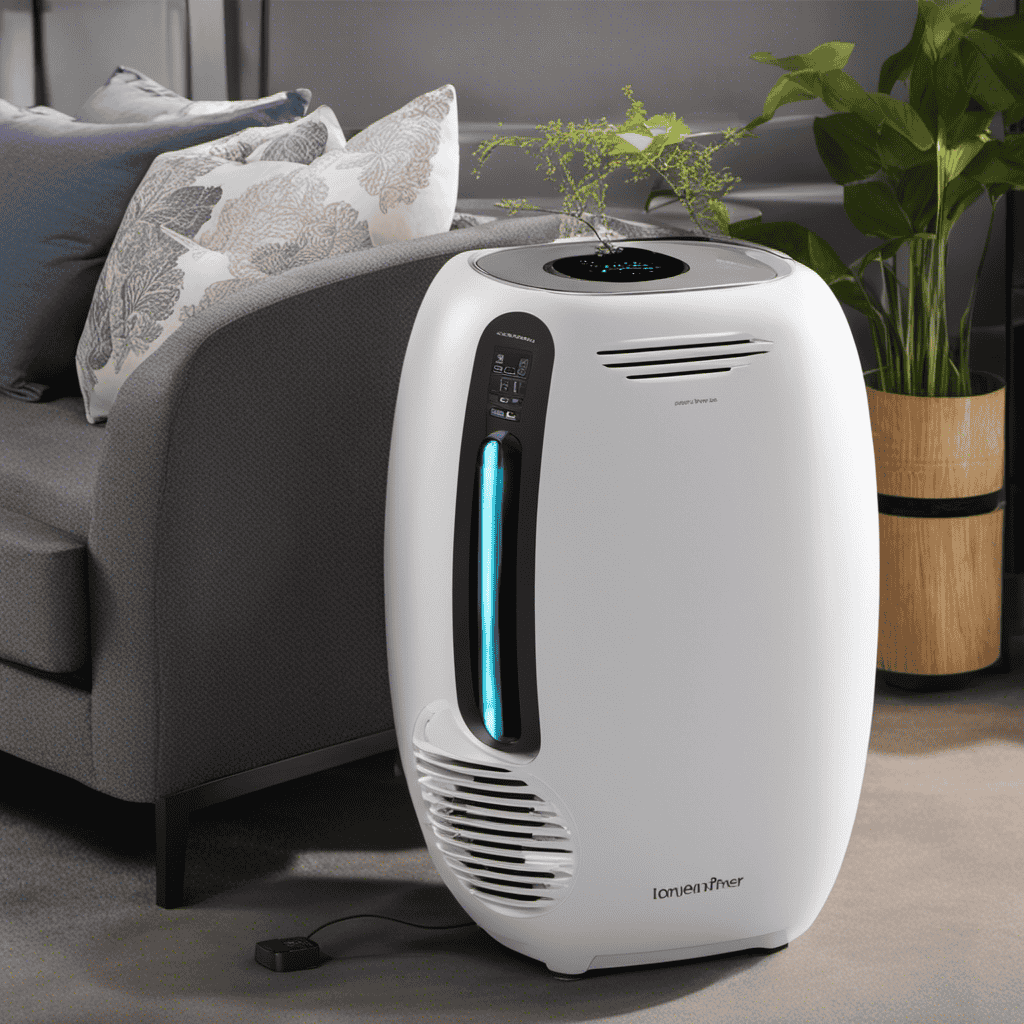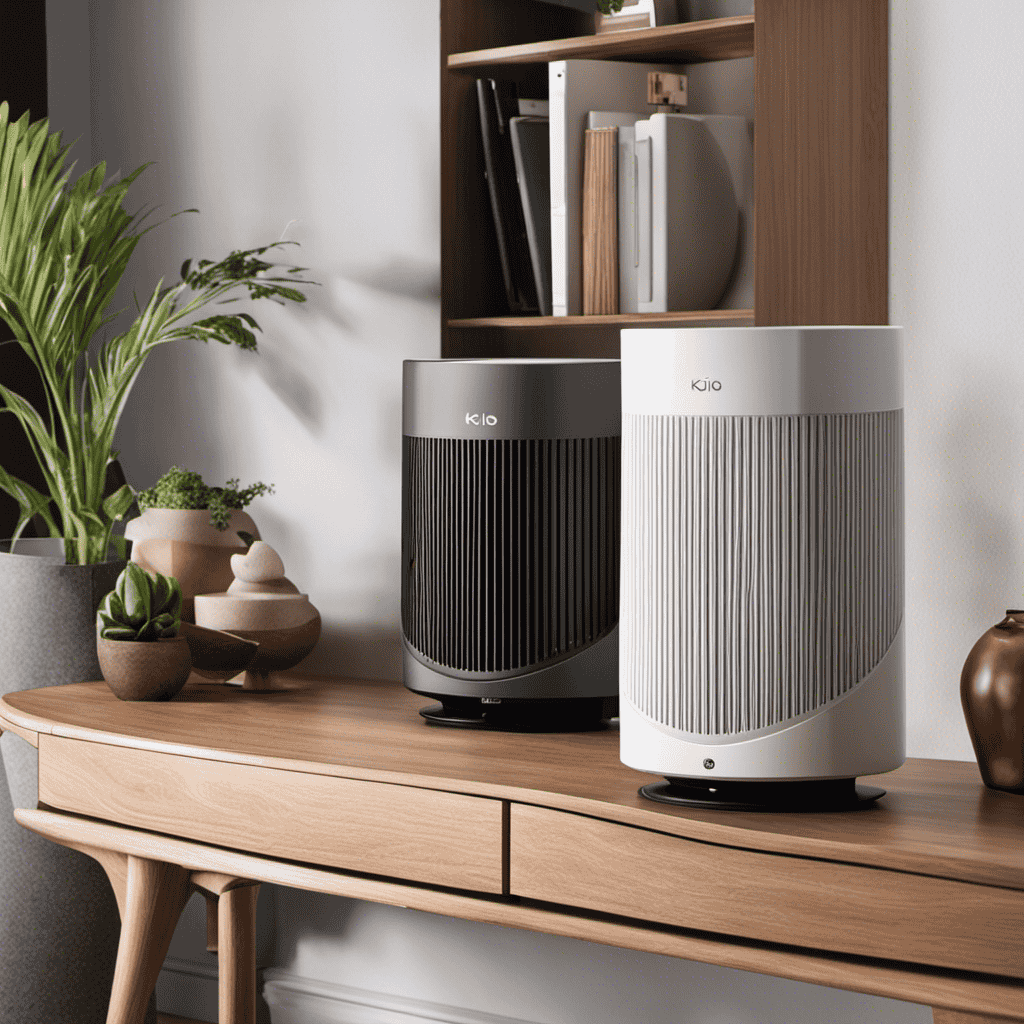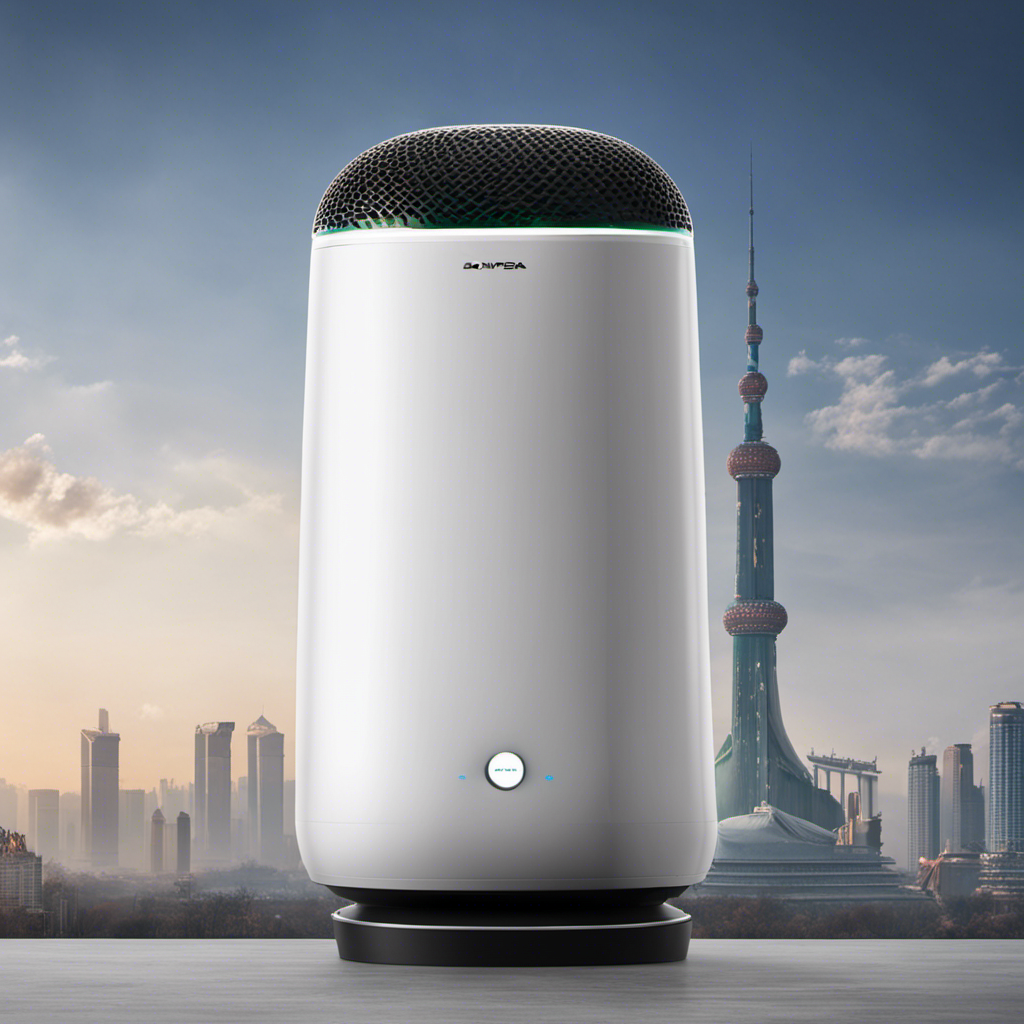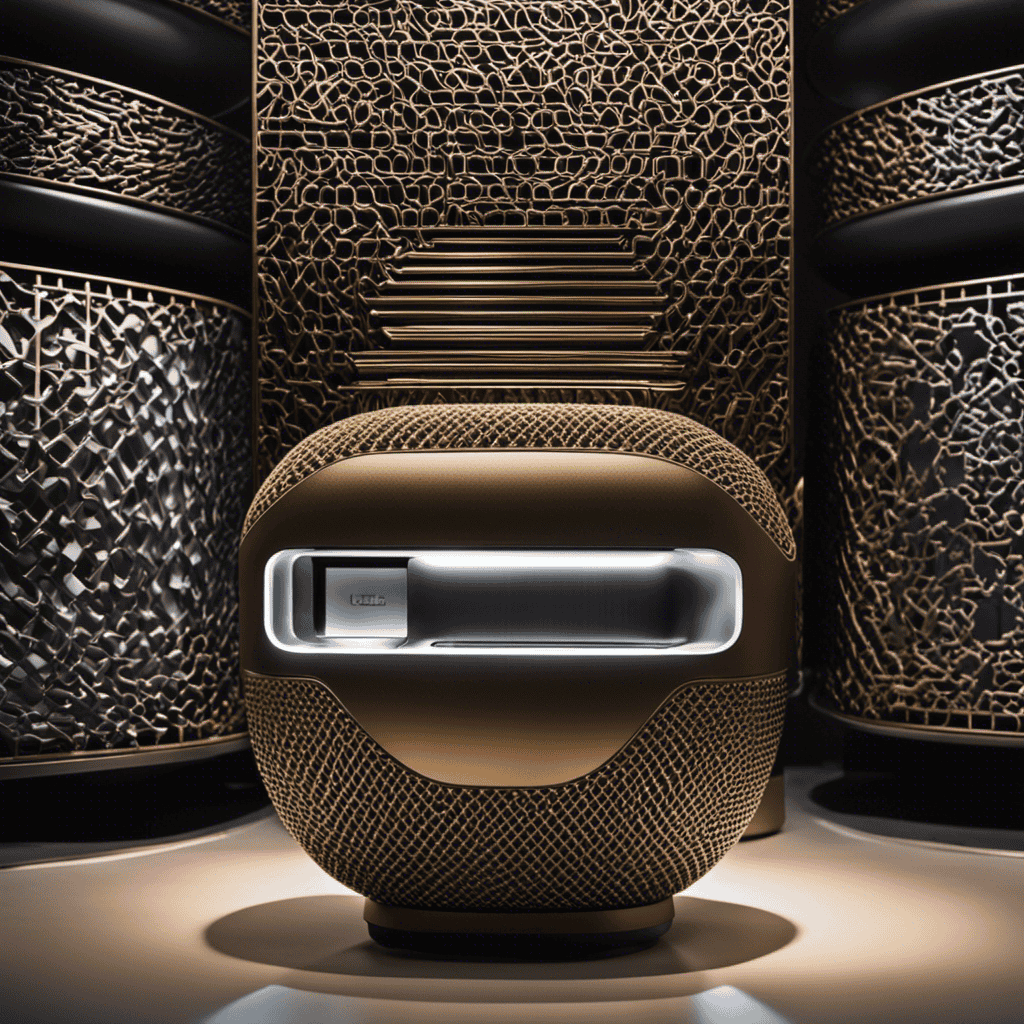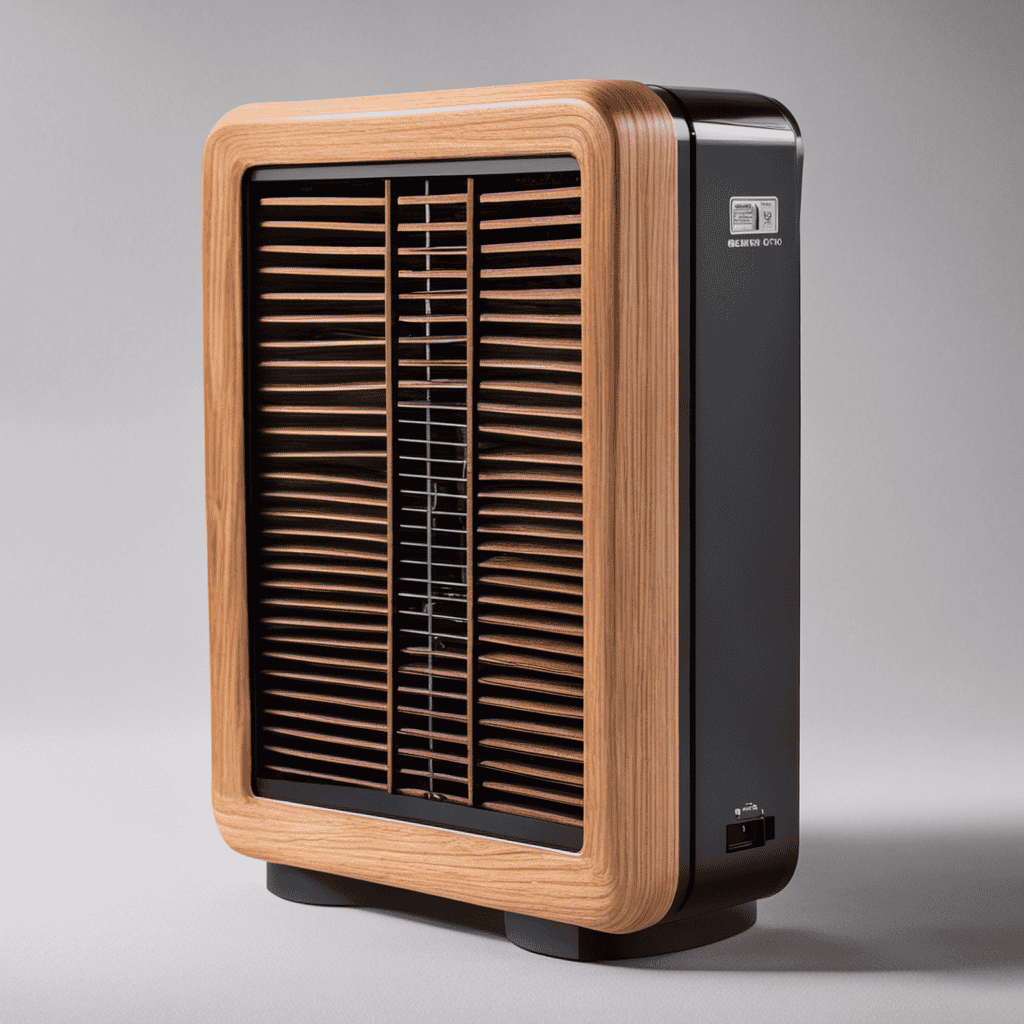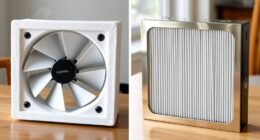As someone who prioritizes health, I’ve made efforts to ensure a clean and secure surrounding for myself. Yet, I came to realize that ionizer air purifiers, which I once thought were advantageous, might not actually offer the benefits they seem to.
In this article, I will delve into the reasons why an ionizer air purifier can have negative consequences for our health. By exploring the scientific evidence and potential respiratory issues caused by these devices, we can gain a better understanding of why they may not be the best choice for improving indoor air quality.
Key Takeaways
- Ionizers release negatively charged ions that can lead to respiratory problems and do not actually remove pollutants from the air.
- Ionizers release ozone into the air, which can cause respiratory problems and reduce air circulation in a room, leading to the buildup of pollutants.
- Ionizers can increase allergens in the environment and negatively affect lung development, especially in children.
- Ozone production from ionizers can have detrimental effects on human health, contribute to smog formation, and damage plant life and ecosystems.
Health Risks Associated With Ionizer Air Purifiers
Using an ionizer air purifier can put you at risk for respiratory issues and worsen your allergies. Ionizer technology works by releasing negatively charged ions into the air. These ions attach themselves to airborne pollutants, such as dust, pollen, and smoke particles, making them heavier and causing them to fall to the ground or stick to surfaces.
While this may seem beneficial, it can actually have negative effects on your health. The increased weight of these particles means that they are more likely to be inhaled into your lungs, potentially leading to respiratory problems. Furthermore, ionizers do not actually remove the pollutants from the air; they simply cause them to settle elsewhere.
This means that even though the air might appear cleaner, the pollutants are still present in your environment. Therefore, it is important to consider the potential health risks before using an ionizer air purifier.
Negative Effects on Indoor Air Quality
When considering the health risks of ionizers, it’s important to note that these devices release ozone into the air. This can be harmful to humans when inhaled in high concentrations. Studies have shown that exposure to elevated levels of ozone can lead to respiratory problems. These problems include coughing, wheezing, and shortness of breath.
Additionally, ionizers can reduce air circulation in a room. This reduction in air circulation can result in stagnant air and potential buildup of pollutants.
Health Risks of Ionizers
Avoid using an ionizer air purifier as it can pose health risks to you. Research has shown that ionizers can negatively impact indoor air quality, particularly for individuals with allergies. These devices release negatively charged ions into the air, which attach to particles like dust and pollen, causing them to stick to surfaces instead of being filtered out. This can lead to an increase in allergens in the environment, triggering allergic reactions and respiratory issues.
Additionally, ionizer air purifiers may have specific health implications for children. Studies have suggested that exposure to high levels of negative ions emitted by these devices could potentially affect a child’s lung development and respiratory health. It is important to consider these risks and opt for alternative air purifying methods that do not involve ionization to protect your health and the health of your loved ones.
Furthermore, ionizers can also contribute to reduced air circulation in indoor spaces.
Reduced Air Circulation
To improve indoor air quality, consider other methods that promote better air circulation in your space. Limited airflow can lead to a stagnant environment, which can negatively impact the air quality and your overall health.
When the air in a room becomes stagnant, pollutants and allergens can accumulate, posing a risk to your respiratory system. Proper ventilation is essential to prevent this from happening. Opening windows and doors, using fans or air purifiers with built-in fans, and installing ventilation systems are effective ways to increase air circulation.
These methods help to remove pollutants and bring in fresh air from outside, reducing the risk of health issues associated with a stagnant indoor environment. Remember, good air circulation is crucial for maintaining a healthy living space.
Ozone Production and Its Dangers
When discussing the subtopic of ozone production and its dangers, it is important to consider both the health risks associated with ozone exposure and the environmental impact of ozone.
Ozone, a gas composed of three oxygen atoms, can have detrimental effects on human health, particularly on the respiratory system. It can also contribute to the formation of smog and have damaging effects on plant life and ecosystems.
Ozone Health Risks
You should be aware that ionizer air purifiers can pose health risks due to the ozone they produce. Ozone, a reactive gas, can have detrimental effects on our respiratory system when inhaled in high concentrations. It can cause shortness of breath, chest pain, coughing, and throat irritation. Prolonged exposure to ozone can also lead to the development or aggravation of respiratory conditions such as asthma and chronic obstructive pulmonary disease (COPD). To better understand the potential risks, let’s take a look at the table below:
| Health Risks of Ozone Exposure |
|---|
| Irritation of respiratory system |
| Shortness of breath |
| Aggravation of asthma and COPD |
Given these health risks, it is important to consider alternative options such as ozone-free air purifiers or proper maintenance of ionizer air purifiers to minimize ozone production.
Environmental Impact of Ozone
If you’re concerned about the environment, it’s important to be aware of the impact that high concentrations of ozone can have.
Ozone pollution, caused by human activities such as industrial emissions and vehicle exhaust, can lead to severe environmental consequences. Ozone is a greenhouse gas that contributes to climate change and can harm vegetation and ecosystems.
High levels of ozone can damage crops and reduce agricultural productivity. It can also lead to the formation of smog, which poses a risk to human health and can worsen respiratory conditions.
Furthermore, ozone pollution can harm aquatic life by depleting oxygen levels in water bodies.
To mitigate these environmental impacts, it is crucial to reduce emissions of ozone precursors and adopt cleaner technologies to protect our planet and its ecosystems from the harmful effects of ozone pollution.
Potential Respiratory Issues Caused by Ionizers
Avoid using an ionizer air purifier as it can potentially cause respiratory issues. Ionizers, which release negatively charged ions into the air, have been associated with triggering allergies and exacerbating respiratory conditions. Here are some potential risks to consider:
-
Increased allergen exposure: While ionizers claim to remove allergens from the air, they can actually make matters worse. The negatively charged ions bind to airborne particles, causing them to become heavier and settle on surfaces, leading to increased exposure and potential allergic reactions.
-
Negative impact on lung function: Research suggests that exposure to ionizers can negatively affect lung function. The release of ions can generate ozone, a harmful gas that can irritate the respiratory system and cause breathing difficulties, especially in individuals with pre-existing lung conditions.
-
Limited scientific evidence: Despite claims made by manufacturers, the scientific evidence supporting the effectiveness and safety of ionizers for improving air quality and respiratory health is limited. It is crucial to prioritize evidence-based interventions and consult with healthcare professionals for personalized advice.
Ionizer Air Purifiers and Asthma Triggers
Worried about asthma triggers? Consider the potential impact of ionizer air purifiers on your respiratory health. Ionizer air purifiers are commonly used to remove airborne particles and improve indoor air quality. However, research suggests that they may have negative effects on individuals with asthma and allergies. These devices work by releasing negatively charged ions into the air, which attach to airborne particles and cause them to fall to the ground or stick to surfaces. While this may sound beneficial, it can actually worsen respiratory symptoms. The ionized particles can irritate the airways, leading to increased coughing, wheezing, and shortness of breath. Furthermore, ionizers can produce ozone, a known lung irritant. Therefore, if you have asthma or allergies, it is important to carefully consider the potential risks before using an ionizer air purifier.
| Pros | Cons |
|---|---|
| Removes airborne particles | May worsen respiratory symptoms |
| Improves indoor air quality | Can produce lung irritant ozone |
Long-term Health Implications of Ionizer Air Purifiers
In my previous subtopic, I discussed how ionizer air purifiers can trigger asthma symptoms. Now, let’s delve into the long-term health implications of using these devices.
- Negative Effects on Lungs:
- Studies have shown that long-term exposure to ionizers can lead to respiratory issues such as coughing, wheezing, and shortness of breath.
- These devices release ions into the air, which can react with other substances to form harmful byproducts like ozone and fine particles.
- Inhaling these byproducts can irritate the lungs and contribute to the development or worsening of respiratory conditions.
It is crucial to consider the potential negative effects on our respiratory health when using ionizer air purifiers. While they may provide short-term benefits, the long-term consequences should not be overlooked. It is advisable to consult with healthcare professionals or consider alternative air purification methods to ensure the safety of our lungs in the long run.
Frequently Asked Questions
Can Ionizer Air Purifiers Completely Eliminate All Airborne Particles and Pollutants From Indoor Spaces?
Ionizer air purifiers are not completely effective in eliminating all airborne particles and pollutants from indoor spaces. They have limitations and may not capture all types of contaminants, such as larger particles or gases.
Are Ionizer Air Purifiers Safe to Use in Homes With Children and Pets?
I have found that ionizer air purifiers can be unsafe for homes with children and pets due to their potential health risks. It is important to consider the effectiveness of these purifiers and the possible negative effects on our well-being.
Can Ionizer Air Purifiers Cause Any Adverse Effects on Electronics or Other Household Appliances?
I’ve researched ionizer air purifiers and found that they can potentially cause adverse effects on electronics and interfere with Wi-Fi signals. This is important to consider when deciding on an air purifier for your home.
Are There Any Specific Guidelines or Regulations Regarding the Use of Ionizer Air Purifiers in Certain Settings, Such as Hospitals or Schools?
There are guidelines and regulations regarding the use of ionizer air purifiers in certain settings, such as hospitals or schools. These regulations ensure the safety and effectiveness of the air purification systems in these sensitive environments.
Do Ionizer Air Purifiers Have Any Impact on the Spread of Viruses or Bacteria in Indoor Environments?
Ionizer air purifiers can have an impact on air quality by reducing the spread of viruses and bacteria. However, their effectiveness in reducing allergies may vary. Scientific evidence supports the use of ionizers for air purification.
Can the Ionizer Function on Air Purifiers Be Harmful to Your Health?
The meaning of ionizer on purifier is to help remove airborne particles, bacteria, and viruses from the air. However, there are concerns about the potential harm it may cause to our health. Some studies suggest that ionizers can produce ozone, which can be harmful when inhaled. It is important to consider these potential risks before using an ionizer air purifier.
Conclusion
In conclusion, it is evident that ionizer air purifiers pose significant health risks. Their negative impact on indoor air quality, ozone production, and potential respiratory issues cannot be ignored.
Moreover, these purifiers have been found to trigger asthma symptoms, adding to their detrimental effects. Considering the long-term health implications associated with ionizer air purifiers, it is crucial to prioritize safer alternatives for cleaner air.
As the saying goes, ‘An ounce of prevention is worth a pound of cure,’ and choosing a non-ionizing air purifier is a wise step towards maintaining our well-being.
